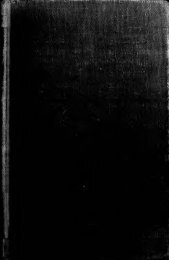Ecclesiastes - GA Barton - 1908.pdf
Ecclesiastes - GA Barton - 1908.pdf
Ecclesiastes - GA Barton - 1908.pdf
You also want an ePaper? Increase the reach of your titles
YUMPU automatically turns print PDFs into web optimized ePapers that Google loves.
130<br />
ECCLESIASTES<br />
conscious of no loss or suffering, hence in comparison with the un-<br />
fortunate in question, Qoheleth regards it fortunate. 5. Yea the<br />
sun it saw not]. The lifeless foetus escaped all sensation. Nor<br />
had knowledge], did not come to consciousness. This has more<br />
rest than the other], freedom from the toil and worry of life. Rest<br />
is an Oriental ideal, and Qoheleth in this expression approaches<br />
the Buddhistic appreciation of Nirvana. 6. A thousand years<br />
twice over], twice the length of an antedeluvian patriarch's life.<br />
And good he does not see], misses the one redeeming feature of<br />
mortal existence, which in 5 18 Qoheleth has recognized to be such.<br />
Are not both going unto the same place?]. Both the lifeless foetus<br />
and the man whose life has been long but wretched, are destined<br />
to Sheol, and the lifeless foetus is to be congratulated because it<br />
reaches the goal by a shorter and less agonizing way. 7. The<br />
man], here the long-lived individual referred to in vs. 6. Mouth<br />
and appetite] are probably used symbolically. One toils all his<br />
life for a satisfaction which he never attains. 8. What advantage<br />
has the wise man over the fool?]. The idea that the lifeless foetus<br />
has an advantage over a prosperous man prompts a repetition of<br />
the thought of ch. 2 l4ff . What, the poor<br />
who knows how to walk<br />
before the living?]. This evidently means, as McN. has seen,<br />
"what advantage has the poor man, who has got on in the world<br />
by knowing how to walk prudently and successfully, before his<br />
fellow-men?" This, like the question about the wise and fools, is<br />
suggested by the comparison of the prosperous, long-lived man<br />
with the lifeless foetus. 9. Better is the sight of the eyes]. The<br />
last clause shows that this expression means " better is the enjoyment<br />
of what one has." Wandering of desire], desires for various<br />
unattainable things.<br />
5 8 (7 >. Sieg. and Ha. regard this verse as the work of a glossator -<br />
Sieg., of Q 4<br />
, his Chasid glossator. Sieg. misinterprets the text, however,<br />
taking nsn in the sense of ffKavda\le





